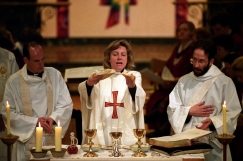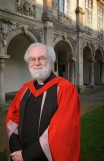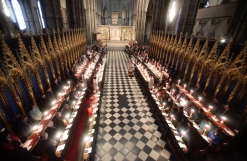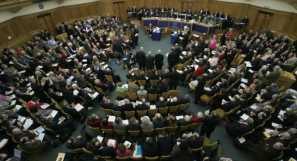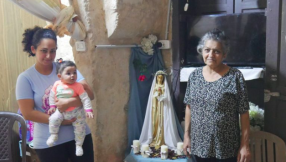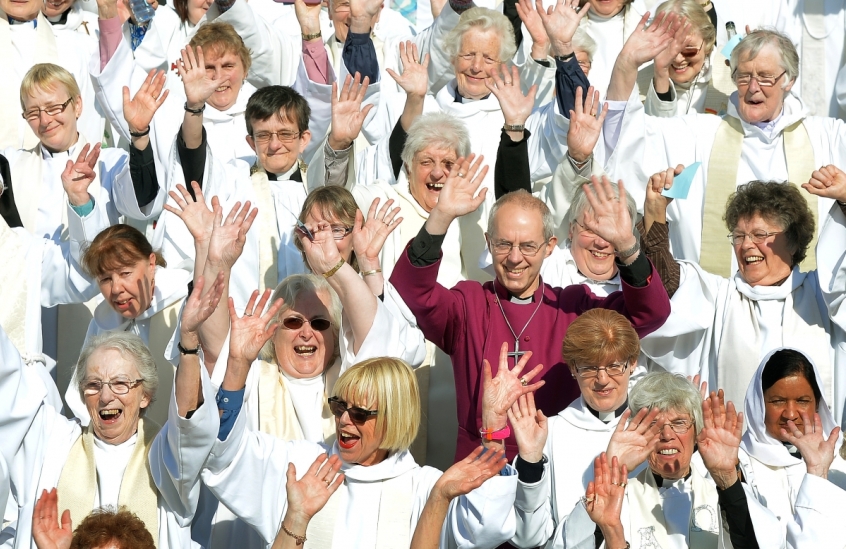
Ending nearly a century of debate, the Church of England is expected finally to vote to consecrate women bishops when the General Synod meets in York on Monday.
The vote comes after earlier legislation was defeated narrowly in November 2012 and led to public humiliation for the established Church, with calls for Parliament to intervene and even disestablishment.
The new legislation is simpler and instead of attempting to define complex arrangements for opponents, is based on Christian understandings of trust.
The opponents are conservative evangelicals, who base their argument on St Paul's edict that a man shall be the "head" of the woman, known as the headship argument, and Anglican Catholics, who are opposed on grounds of tradition and the male line of apostolic succession from the first disciples. This is the same argument used by the Orthodox and Roman Catholic churches.
Many opponents are still expected to vote against as they did last time, but this time, it is hoped that supporters of women bishops will show stronger backing for the new measure because of better provision for opponents, and because it has more ecclesiological integrity. Swing voters who last time were concerned about the nature of the legislation are understood to be happier and it is understood that some traditionalists who opposed it last time might not go as far as to support it, but at least might abstain.
Provisions for dissenters are contained in a House of Bishops Declaration. Dissenting parishes will be able to ask their diocesan bishop to make arrangements for them to be cared for by a male bishop. In addition, when a vicar leaves, they may ask for a male vicar to be appointed. The diocesan bishop will make arrangements after conversation with the parish. If a parish is not content with the arrangements or how they are made, they may complain to an Independent Reviewer.
The vote comes as even its supporters acknowledge that the Church of England would probably not survive another defeat for women bishops' legislation in its present form. It is understood that the Archbishop of Canterbury Justin Welby is prepared to force the issue in the event that the synod does manage to vote its way to another "fail".
The synod could be dissolved, or secular legislative processes could be used by bishops in the House of Lords to change the law in parliament without the consent of synod, which would almost certainly lead to a constitutional debate and give impetus to proponents of disestablishment.
MPs could respond by seeing through their threats to remove the Church of England's existing exemption from equality legislation.
The main conservative evangelical group, Reform, is telling its members to oppose the new package. Reform says in its statement: "There are outstanding issues of jurisdiction and oaths of canonical obedience, particularly once the canons suggest a woman can be a church's Chief Pastor, Principal Minister and Father in God, which mean that the package fails to meet the conscientious needs of a significant number of our members.
"The process may also distract us from gospel ministry. Parochial church councils will have to enter into time-consuming discussions with the diocesan bishop about the nature of their theological convictions and corresponding episcopal requirements without any guarantee they will be respected.
"The independent review process is based on 'shame' and thus, if needed, will require churches to engage in unedifying public disagreements with their bishop, again without any guarantee that the reviewer's findings will be implemented."
Reform adds: "We will continue to encourage all friends and members of Reform to vote against the measure in July and trust that God will provide all that we need in the future."
The synod's Catholic group is calling for prayers. The chair, Canon Simon Killwick, said: "Following the failure of the previous legislation in November 2012, the Catholic Group immediately called for round-table talks to agree on a new package which could be fast-tracked through the Synod. These talks have been amazingly fruitful in that they have generated a new package which provides a way forward for everyone in the Church of England and the package is being fast-tracked through the Synod with the added bonus in the creation of a much more positive atmosphere of trust, generosity and mutual respect. We look forward to this new atmosphere pervading the debates at the forthcoming Synod and beyond, so that we can all move forward as one."
Although a third of Church of England clergy are now women, 3,550 out of 11,375, nearly half the women work for no pay, compared to one fifth of male clergy in this situation, and they make up fewer than a quarter of stipendiary clergy. Just one third of women train in the traditional residential setting of a theological college, whereas six in ten men do - something which makes a big difference to a CV. Only one of the church's current bishops trained on a non-residential course. Statistics show that women clergy are ordained older, more likely to be ministering in a voluntary capacity, less likely to hold positions of responsibility.
In 1920 the subject of women's ordination was first put on the agenda of the Lambeth Conference, the ten-yearly gathering, now in Canterbury, of bishops from around the world, but the vote was lost. Another attempt in 1930 also went down and an archbishops' commission in 1935 recommended against. Nevertheless in 1944, Bishop Ronald Hall of war-torn Hong Kong went ahead and ordained a Chinese Deacon, Florence Li Tim-Oi, as the Anglican Communion's first woman priest. In spite of the acknowledged success of her ministry, in 1968 the Lambeth Conference still found arguments for and against ordination of women "inconclusive". By 1971 the mood was changing, and the Anglican Consultative Council, the most senior advisory body in the Anglican Communion, chaired by Archbishop of Canterbury, then Dr Michael Ramsey, passed "resolution 28" which advised bishops that, with the approval of their province, they could ordain women to the priesthood.
In 1974, as a result, 11 women in America were "irregularly" ordained by three US bishops and the following year, the General Synod voted that there is "no fundamental objection to the ordination of women to the priesthood." In 1976 the Episcopal Church in the US became the first to vote formally to ordain women and the previous irregular ordinations were also accepted. In 1978 an attempt in synod in England to "bring forward legislation to remove the barriers to the ordination of women to the priesthood and their consecration to the episcopate" failed after six and a half hours of debate. That prompted the foundation of the Movement for the Ordination of Women in 1979. The synod took its first tentative steps a few years later, voting to ordain women deacons. The first women were ordained in 1987, the year before the first women were elected bishops in the US and New Zealand.
To date 37 women have been consecrated bishop in the Anglican Communion and of these, 28 are currently serving.
Finally, in 1992, in one of the most memorable votes in history, the synod narrowly agreed to ordain women priests and the first were ordained in 1994 at Bristol Cathedral at Easter. Women bishops were always regarded as the greater difficulty, however, because of a bishop's role in the exercise of authority and in ordination, and it was not until 2005 that the synod approved a motion to begin the process to remove "legal obstacles" to women in the episcopate. Although by 2011 legislation had been drawn up that was approved by 42 out of 44 dioceses, the problems over authority and the legislation's tortuous attempt to resolve these were never resolved adequately, leading to its defeat in 2012.
The new Archbishop of Canterbury, Justin Welby, brought in as his director of reconciliation Canon David Porter from Coventry cathedral, who had cut his teeth in helping with the peace agreement in Northern Ireland. New, simpler legislation is the result, combined with a noticeable lessening of acrimony.
Hilary Cotton, chair of Women and the Church, said the legislation this time was simpler and also framed in a different context that made it more likely to work on the ground. Women saw off the attempt by the Archbishops of Canterbury and York to introduce a concept of "coordinate jurisdiction" that they felt would compromise the authority of a female bishop by giving equal authority to a male traditionalist in her diocese. But the legislation was still long and confusing in how it articulated the authority and jurisdiction of the woman diocesan.
She said: "Before, it was not complete. The Code of Practice was not written and the arrangements for those opposed were not fully formed. Each diocese was going to have to create its own scheme for opponents and that was both very complicated and raised the possibility of a real lack of consistence across the dioceses.
"This time it is effectively a single-clause measure, which is what we always wanted. So it is simpler. The arrangements for those opposed are within a different framework. It is not so spelled-out. Conversations will take place between the diocesan bishop and the parish concerned within the context of the five principles in the declaration of the House of Bishops. The diocesan will be asked to make arrangements that are suitable for the parish. If they do not like what she decides to do, the parish can go to the independent reviewer."
She is not complacent that it will go through.
Mrs Cotton said: "If it does not go through it will be shocking for the Church of England and everyone who supports it. We would regroup and see what happens. If it does go through it will be a tremendous relief for everybody not to have to go through this argument again."
The five guiding principles in the House of Bishops declaration.
1. Now that legislation has been passed to enable women to become bishops the Church of England is fully and unequivocally committed to all orders of ministry being open equally to all, without reference to gender, and holds that those whom it has duly ordained and appointed to office are the true and lawful holders of the office which they occupy and thus deserve due respect and canonical obedience;
2. Anyone who ministers within the Church of England must be prepared to acknowledge that the Church of England has reached a clear decision on the matter;
3. Since it continues to share the historic episcopate with other Churches, including the Roman Catholic Church, the Orthodox Church and those provinces of the Anglican Communion which continue to ordain only men as priests or bishops, the Church of England acknowledges that its own clear decision on ministry and gender is set within a broader process of discernment within the Anglican Communion and the whole Church of God;
4. Since those within the Church of England who, on grounds of theological conviction, are unable to receive the ministry of women bishops or priests continue to be within the spectrum of teaching and tradition of the Anglican Communion, the Church of England remains committed to enabling them to flourish within its life and structures; and
5. Pastoral and sacramental provision for the minority within the Church of England will be made without specifying a limit of time and in a way that maintains the highest possible degree of communion and contributes to mutual flourishing across the whole Church of England.










